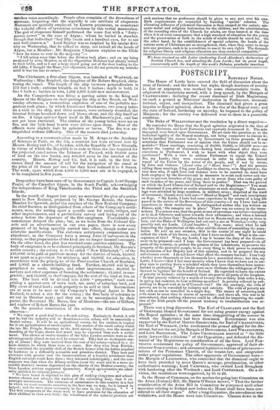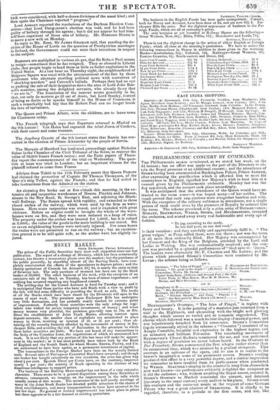POSTSCRIPT.
SATURDAY NIGHT.
The House of Lords have entered the field of discussion about the state of Ireland ; and the debate last night, though destitute of novelty in fact or argument, was marked by some characteristic traits. It originated in resolutions moved, with a long speech, by the Marquis of CLANRICARDE ; declaring the recent dismissal of Irish Magistrates, on such a ground as Ministers' declaration in Parliament, unconsti- tutional, unjust, and inexpedient. The dismissal had given a great impulse to Repeal agitation, shown in the rise of the Repeal rent ; and the state of Ireland, bordering on anarchy, he imputed to the policy of Ministers ; for the country was delivered over to them in a peaceable condition.
The Duke of WELLINGTON met the resolution by a direct negative— He reminded the House that the Repeal agitation originated in the time of the late Ministers, and Lord Fortescue had expressly denounced it. The acts impugned were forced upon Government. He set aside the question as to the technical legality of the Repeal meetings, not being competent to discuss it ; but he justified the course taken by Government on these grounds. It was notorious that Parliament was of opinion that the Union should not be re- pealed—" These meetings, consisting of 20,000, 10,000, or 100,000 men—no matter the number of thousands—having been continued after these de- clarations in Parliament, I wish to know with what object they were continued ? With a view to address Parliament to repeal the Union? No, my Lords ; they were continued in order to obtain the desired repeal of the Inion by the terror of the people, and if not by terror, by force and violence. (Loud cries of " Bear, hear l ") And the persons calling these meetings, I beg your Lordships to observe, were Magistrates ; the very men who, if such force and violence were to be resorted to, must have been employed by the Government in measures to resist such terror and vio- lence to prevent breaches of the peace, and to arrest those who were guilty of such breaches of the peace, and bring them to justice." That was the ground on which the Lord Chancellor of Ireland said to the Magistrates—" You must be dismissed if you attend or excite attendance at such meetings." The meet- ings were attended by large numbers, in military array; dispersed at the word of command; threats were held out—" Blood or Repeal " and such inscriptions on flags. " My Lords, I have had some experience in the course of a long life passed in the service of the Sovereigns of this country—I say I have had some experience in these revolutions. A distinguished author who has written on France, said, On conspire sur la place.' There was no secrecy in the trans- actions. The reason was, that the great means of operation was terror—deception as to their followers, and terror towards their adversaries; and when a learned gentleman declares that Napoleon bad not in Russia such an army as there is here, and the Duke of Wellington had not such a one at Waterloo, —why. very possibly not, my Lords. (Loud laughter.) Nay, more mind what he said respecting the organization of this army and the means of.assembling the popu- lation. He said on one occasion, that in the course :of one night he could collect the whole of his forces; and of that I have no doubt. What is the con- sequence of this ? Why, my Lords, I say it became the duty of the Govern- ment to be prepared—and I hope the Government has been prepared—in all parts of the country, to protect the persona of the inhabitants, to preserve the property. of the peaceable people, to do every thing in their power to maintain the dominion of her Majesty and of this country, and to be prepared for any unfortunate event. I do not know what effect the measure has had : I can't say whether more thousands or less thousands have assembled since; but this, my Lords, I know—that I feel more security when I know that we have not to em- ploy men in putting-down a mischief which they have themselves been instru- mental in producing." The Duke went on to vindicate the willingness of Par- liament to legislate for the benefit of Ireland. He regretted to learn the extent of poverty in Ireland ; unfortunately there are poor in all parts of the kingdom. " Is that poverty relieved.by a march of twenty-five or thirty Irish miles a day, in spring and summer, to hear seditious speeches ? Is poverty relieved by sub- scribing to Repeal rent or, to O'Connell rent ? On the contrary, the evils of poverty are to be remedied by industry and sobriety. The evils of poverty are not such as can be remedied in a single day. The means of correcting such evils must be some time in course of operation ; and above all, this was to be remembered, that nothing whatever could be effected for improving the condi- tion of the Irish people till the present tendency to insubordination was re- pressed."
There was a long discussion. The Earl of CIANCARTY and the Earl of GLENGALL blamed Government for not using greater energy against the Repeal agitation ; at the same time disapprobing of the manner in
which the Magistrates had been dismissed. overnment was also
supported by the Earl of MOUNT-EDGECUMBE, the I of CMARLEVILLE,
the Earl of Wicsiow, (who condemned the ground alleged for the dis- missal, but not the act,) the Marquis of DOWNSHIRE, Lord WHABNCLIFFE, and Lord BROUGHAM. The LORD CHANCELLOR sneered at " the little petty lawyer-like criticisms" of the Opposition ; and defended the dis- missal of the Magistrates on consideration of all the facts. Lord FOR.. TESCUE condemned the policy of Government; approved of their ab- stinence from coercion ; and advocated legislative redress of grievances— reform of the Protestant Church, of the tenant-law, and emigration under proper regulations. The other opponents of Government were— the Marquis of LANSDOWNE, who contended that the dismissal ought to have been preceded by some Queen's message, proclamation, or other authoritative warning ; Lord CAMPBELL, who twitted Lord Brougham with hankering after the Woolsack ; and Lord CorrEwasm. On a di- vision, the resolutions were negatived, by 91 to 29.
In the House of Commons, on the motion for going into Committee en
the Arms (Ireland) Bill, Mr. Slum O'BRIEN moved, " That the further consideration of the Arms Bill in Committee be postponed until other measures relating to Ireland now before the House shall have been con- sidered in all their stages." After a long discussion, the amendment was their children in their own faith : the inhabitants of the colonial province are withdrawn, and the House went into Committee. Clauses down to the 24th were considered, with half-a-dozen divisions of the usual kind ; and then again the Chairman reported " progress."
Lord ASHLEY reported the resolutions of the Durham Election Com- mittee—that Lord Dungannon's election was void, and he had been guilty of bribery through his agents ; but it did not appear he had him- self been cognizant of those acts of bribery. Mr. Howson HINDE is to move a new writ on Monday. In reply to Mr. Ross, Sir JAMES GRAHAM said, that pending the de- cision of the House of Lords on the question of Presbyterian marriages in Ireland, the Government could not state their intentions in respect to the subject.



























 Previous page
Previous page